Winnipeg Arena was an indoor arena located in the Polo Park district of Winnipeg, Manitoba, Canada.
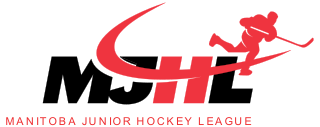
The Manitoba Junior Hockey League (MJHL) is a Junior 'A' ice hockey league operating in the Canadian province of Manitoba and one of nine member leagues of the Canadian Junior Hockey League (CJHL).
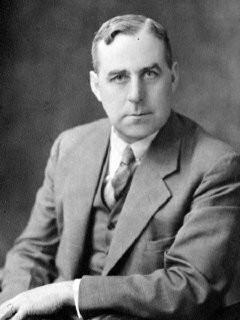
William Raymond "Toby" Sexsmith was a Canadian politician and ice hockey administrator. He was elected three times as a Progressive Conservative Party member of the Legislative Assembly of Manitoba representing the Portage la Prairie riding from 1933 to 1943. He served as president of the Manitoba Amateur Hockey Association from 1921 to 1923, and sat on the association's executive committee for 25 years. He served as president of the Canadian Amateur Hockey Association (CAHA) from 1922 to 1924, and set a precedent that future CAHA presidents would also be given two-year terms.
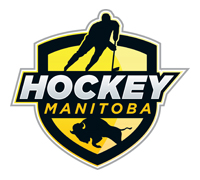
Hockey Manitoba is the governing body of amateur ice hockey in the province of Manitoba, Canada. Hockey Manitoba was founded in 1914 as the Manitoba Amateur Hockey Association and is a branch affiliate of Hockey Canada.

Shea's Amphitheatre, also known as the Winnipeg Amphitheatre, was an indoor arena located in Winnipeg, Manitoba, Canada. It seated 6,000 spectators.

Claude Copeland Robinson was a Canadian ice hockey and sports executive. After winning an intermediate-level championship as captain of the Winnipeg Victorias in 1905, he served as secretary-treasurer and as vice-president of the Victorias. He coached the Victorias to a Manitoba Hockey League championship in 1909, and felt that his team could have competed for the newly established Allan Cup, despite that challenges from senior ice hockey teams were accepted only from Eastern Canada at the time. The Victorias won the Allan Cup by default in 1911, when the Toronto St. Michael's Majors refused to play, then successfully defended four challenges for the trophy.

James Archibald Dunn was a Canadian sports executive involved in ice hockey, baseball, fastpitch softball, athletics, football and curling. He was president of the Canadian Amateur Hockey Association (CAHA) from 1955 to 1957, after five years as vice-president. He assumed control of the CAHA when it failed to produce a Canada men's national team which would win the Ice Hockey World Championships, and recommended forming a national all-star team based on the nucleus of the reigning Allan Cup champion. Wanting to create goodwill in international hockey, accompanied the Kenora Thistles on an exhibition tour of Japan, then arranged for the Japan men's national team to tour Canada. In junior ice hockey, he was opposed mass transfers of players to the stronger teams sponsored by the National Hockey League, and supported weaker provincial champions to have additional players during the Memorial Cup playoffs. He later represented the CAHA as a member of the Hockey Hall of Fame selection committee for 15 years.
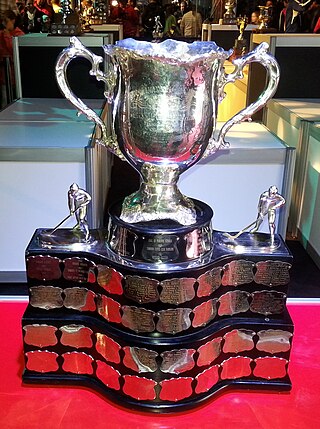
The 1935 Memorial Cup final was the 17th junior ice hockey championship of the Canadian Amateur Hockey Association (CAHA). The George Richardson Memorial Trophy champions Sudbury Cub Wolves of the Northern Ontario Hockey Association in Eastern Canada competed against the Abbott Cup champions Winnipeg Monarchs of the Manitoba Junior Hockey League in Western Canada. In a best-of-three series, held at Shea's Amphitheatre in Winnipeg, Manitoba, Winnipeg won their 1st Memorial Cup, defeating Sudbury 2 games to 1.

Allan Wilfrid Pickard was a Canadian ice hockey administrator, who served as president of the Canadian Amateur Hockey Association (CAHA) from 1947 to 1950. When Canada opted out of the 1947 Ice Hockey World Championships and decided not to participate in the 1948 Winter Olympics, Pickard felt that Canada was obliged to send a team due to its place as a top hockey nation, and nominated the Ottawa RCAF Flyers who won the gold medal for Canada and lived up to the requirements of the Olympic Oath as amateurs. Despite disagreement with the International Olympic Committee, he sought for the International Ice Hockey Federation to adopt the CAHA definition of amateur in the face of increasing difficulty in selecting the Canada men's national ice hockey team.
The Manitoba Hockey Association (MHA) was an early men's senior ice hockey league playing around 1900 in Manitoba, Canada. The league started as an elite amateur league in 1892, became professional in 1905, had a professional and an amateur league in 1908–09 and only an amateur league from 1909 until 1923. Two teams from the league won the Stanley Cup, the Winnipeg Victorias and the Kenora Thistles. Three other teams from the league challenged for the Stanley Cup: Brandon Wheat City, Winnipeg Maple Leafs, and the Winnipeg Rowing Club. Other teams in the league won the Allan Cup: Winnipeg Hockey Club, Winnipeg Falcons, Winnipeg Monarchs and Winnipeg Victorias.
Jimmy Dunn was hired as commissioner of the Manitoba Junior Hockey League (MJHL) in May 1964. The league had been reduced to four teams based in the Greater Winnipeg area after the withdrawal of the Brandon Wheat Kings and the Fort Frances Royals. The MJHL transitioned from a draft of players in the Greater Winnipeg Minor Hockey Association, into a system where each team chose players from a set geographic district. The new "zoning" arrangement was planned to be in effect for three seasons to stimulate more localized interest in junior hockey and aimed to keep teammates together from the minor hockey level to the junior hockey level. Dunn supported the change and noted that the concept had produced forward lines on previous Memorial Cup championship teams from Winnipeg. The Charlie Gardiner Memorial Trophy series was revived as a preseason tournament for the league's teams. Dunn reached an agreement to televise MJHL games on CJAY-TV, and the league experimented with playing games on Sunday evenings instead of afternoons to increase its attendance and avoid competing with televised football games. Dunn requested to the Canadian Amateur Hockey Association (CAHA) that the MJHL waive its bye into the Abbott Cup finals and its playoffs champion meet the Thunder Bay Junior A Hockey League champion in the first round. He felt that the loss of gate receipts from a bye was a financial hardship for the MJHL, and shorten the league's playoffs to accommodate the change approved by the CAHA.

The Winnipeg Monarchs were a Canadian senior ice hockey team from Winnipeg, Manitoba, that was organized in 1906. The Monarchs won the 1915 Allan Cup as the Canadian Senior Hockey Champions. In 1935 the Monarchs won gold for Canada at the World Ice Hockey Championships.
The Seven Oaks Sportsplex is an indoor ice hockey and soccer complex in Winnipeg, Manitoba, Canada. The complex consists of the Seven Oaks Arena and the Seven Oaks Soccer Complex. It is located on the grounds of the Garden City Community Centre, immediately east of the Garden City Shopping Centre, in the Garden City area.
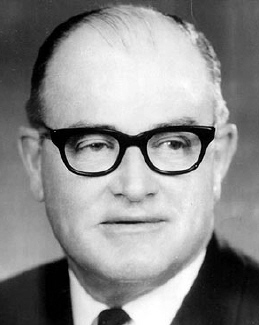
Frank Forest Sargent was a Canadian sports executive in ice hockey and curling. He served as president of the Canadian Amateur Hockey Association (CAHA) from 1942 to 1945, and was president of the Dominion Curling Association (DCA) from 1965 to 1966. He was the first person to be elected to more than two terms as CAHA president, and the first to be president of two national amateur sporting associations in Canada.

Edward Albert Gilroy was a Canadian ice hockey administrator. He served as president of the Manitoba Amateur Hockey Association (MAHA) from 1927 to 1934, and the Canadian Amateur Hockey Association (CAHA) from 1934 to 1936. In Manitoba, he sought to expand senior ice hockey and establish co-operation between teams and owners of the Winnipeg Amphitheatre on schedules and reducing travel costs. He wanted all players aged 21 and younger to remain in junior ice hockey and began to negotiate with professional teams to refrain from signing them to contracts. His seven years as leader of the MAHA was the longest tenure for a president at the time, during which he oversaw continued growth of the association and improvement of finances.

William Franklin Taylor was a Canadian ice hockey administrator. He was the founding president of both the Canadian Amateur Hockey Association (CAHA) and the Manitoba Amateur Hockey Association in 1914, and also served as president of the Winnipeg Amateur Hockey League. He sought for the Allan Cup to be symbollic of the amateur hockey championship of Canada, and to establish a national authority to oversee competition for the trophy. He allied the CAHA with the Amateur Athletic Union of Canada against professionalism and to promote amateur sport and expand hockey in Canada. He supported a desire by the players to govern their own affairs, to standardize ice hockey rules and ice hockey rink dimensions, and recognition of the authority and judgment of on-ice officials. Taylor assisted with patriotic fundraising to contribute to the World War I effort in Canada, and served the community in Winnipeg as a leading member of the Elks and the Shriners. He sat on the board of governors for The Children's Hospital of Winnipeg and the local Children's Aid Society, and was posthumously inducted into the Manitoba Hockey Hall of Fame in 1992.
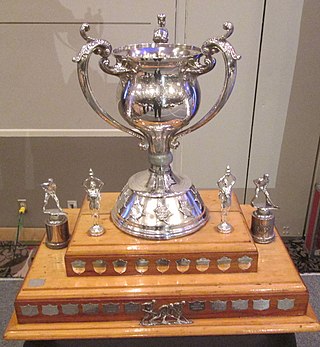
The Western Canada Junior Hockey League was a junior ice hockey based in Alberta and Saskatchewan from 1948 until 1956. It was formed by teams which sought a higher level of competition and more formal organization. Its teams were eligible for the Memorial Cup as the national junior champion of the Canadian Amateur Hockey Association, and were runners-up in five seasons as the Abbott Cup junior champion of Western Canada.
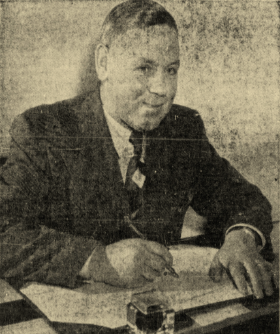
Douglas George Grimston was a Canadian ice hockey administrator who served as president of the Canadian Amateur Hockey Association (CAHA) from 1950 to 1952. He oversaw the establishment of the Major Series for the Alexander Cup and implemented a new deal for player contracts in senior ice hockey, in response to the Allan Cup championship being dominated by a small group of teams who sought to protect themselves from professional leagues recruiting their players. He opposed the National Hockey League wanting its junior ice hockey prospect players on stronger teams, which led to limits on the transfer of players to keep balanced competition for the Memorial Cup. After the 1952 Winter Olympics where the Canada men's national ice hockey team won the gold medal, Grimston recommended withdrawal from Olympic hockey since European nations would never agree to ice hockey rules which allowed physical play. Grimston later accused International Ice Hockey Federation vice-president Bunny Ahearne of financially exploiting of the Edmonton Mercurys on a European tour, which led to a physical altercation between them.
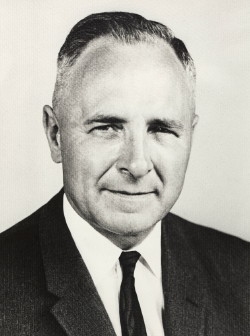
Arthur Thomas Potter was a Canadian ice hockey administrator. He was president of the Canadian Amateur Hockey Association (CAHA) from 1962 to 1964, and oversaw the establishment of a permanent Canada men's national ice hockey team after he decided that sending the reigning Allan Cup champion to international competitions was no longer the answer. He felt that Canada needed discipline to handle Cold War tactics and propaganda at the Ice Hockey World Championships, sought to give its best players to develop as a team, and supported a plan by Father David Bauer to assemble a team of amateur student athletes to complete at the 1964 Winter Olympics.

Mary Dunn was a Canadian sports executive. She played on the Manitoba Bisons women's ice hockey team while in university, then became an executive with the Winnipeg Women's Senior Hockey League and the Manitoba Ladies' Hockey Association. She later served as vice-president, and then president of the Dominion Women's Amateur Hockey Association, where she arranged playoffs for the Canadian women's hockey championship. She was married to fellow sports executive Jimmy Dunn, and co-ordinated amateur sports for ladies as the vice-president then president of the Manitoba branch of the Women's Amateur Athletic Federation of Canada. She later served as president of the Winnipeg Community Chest, the Central Volunteer Bureau of Manitoba, and the Oriole Community Club in Winnipeg.
















